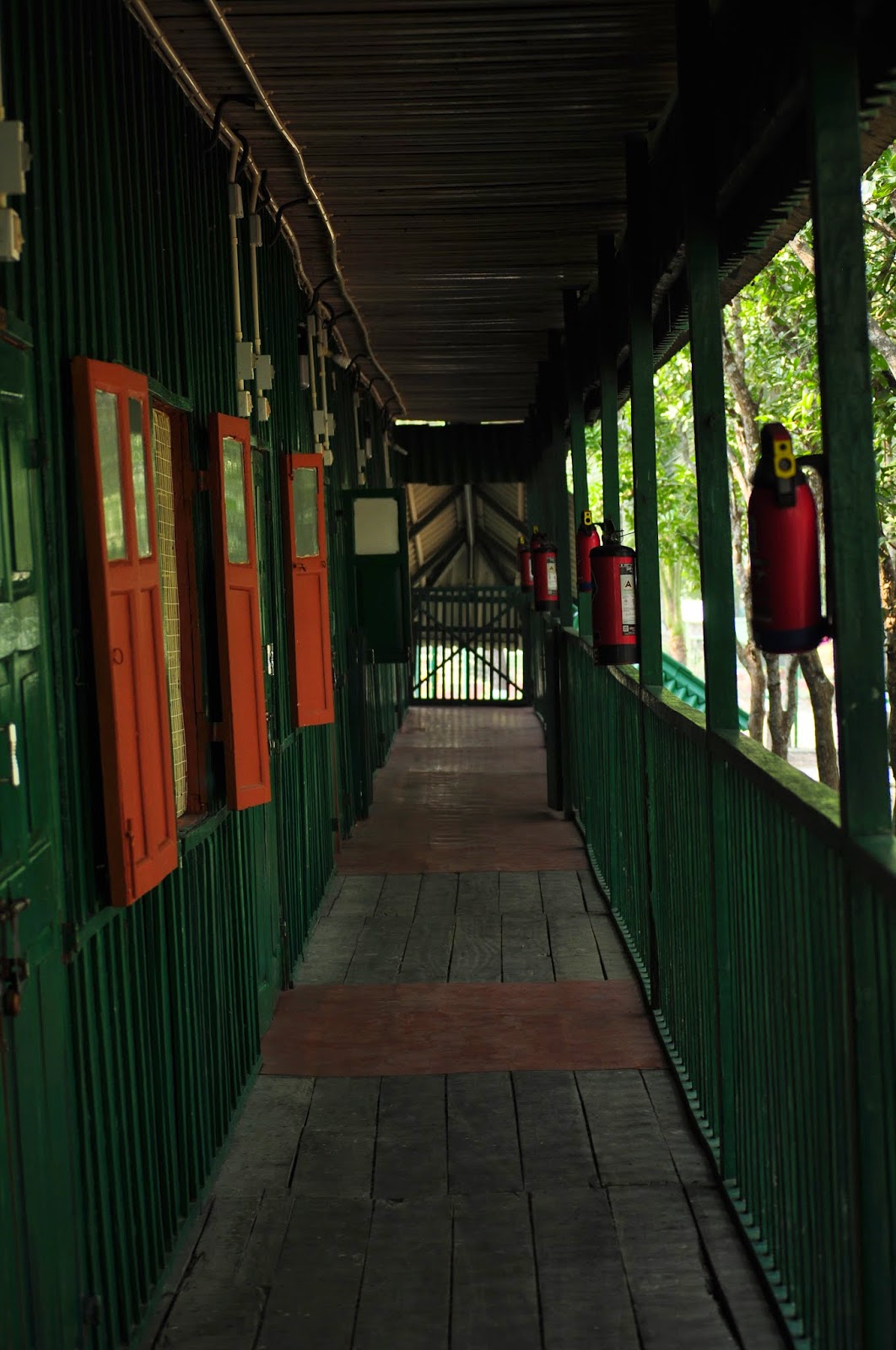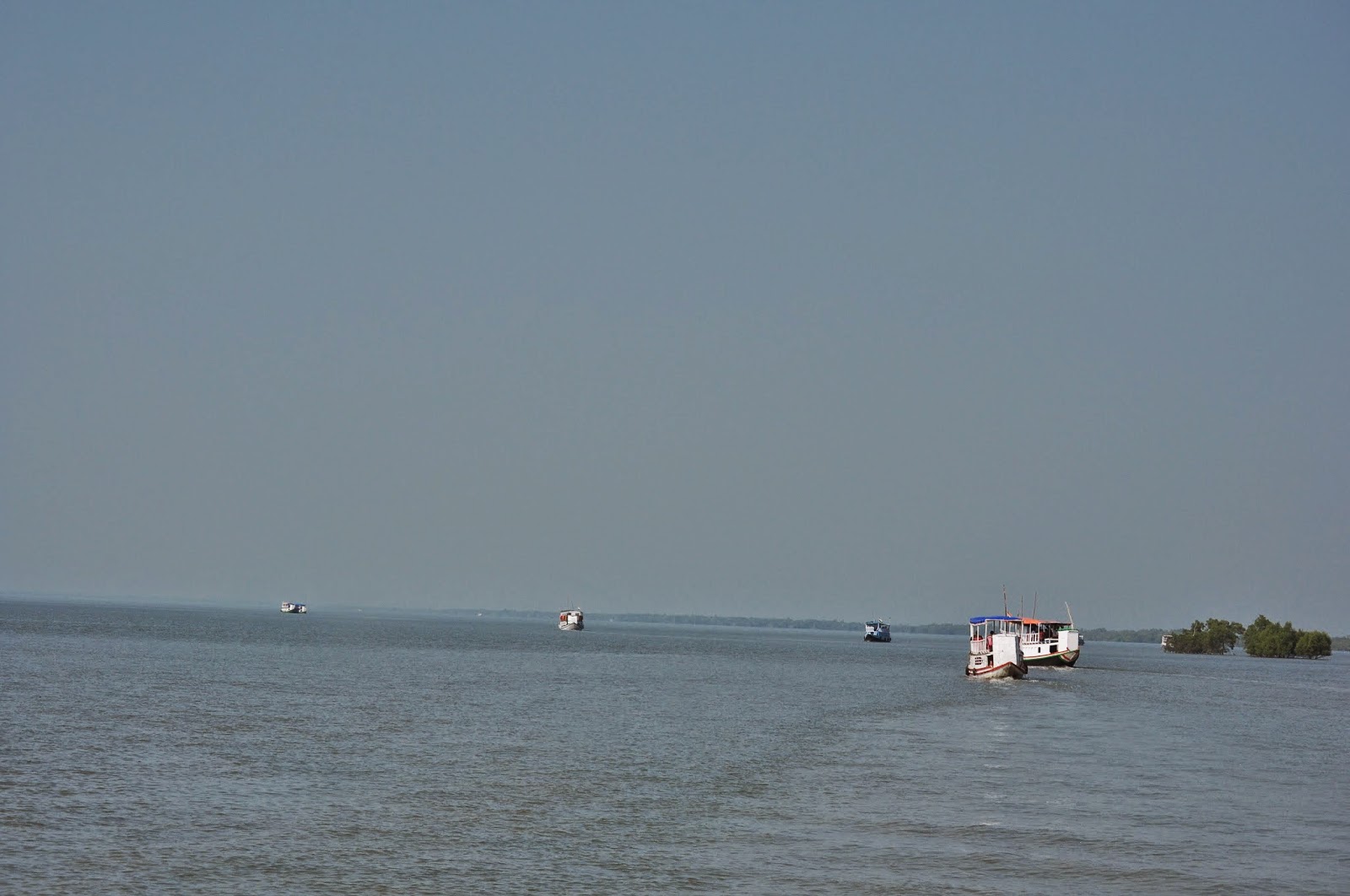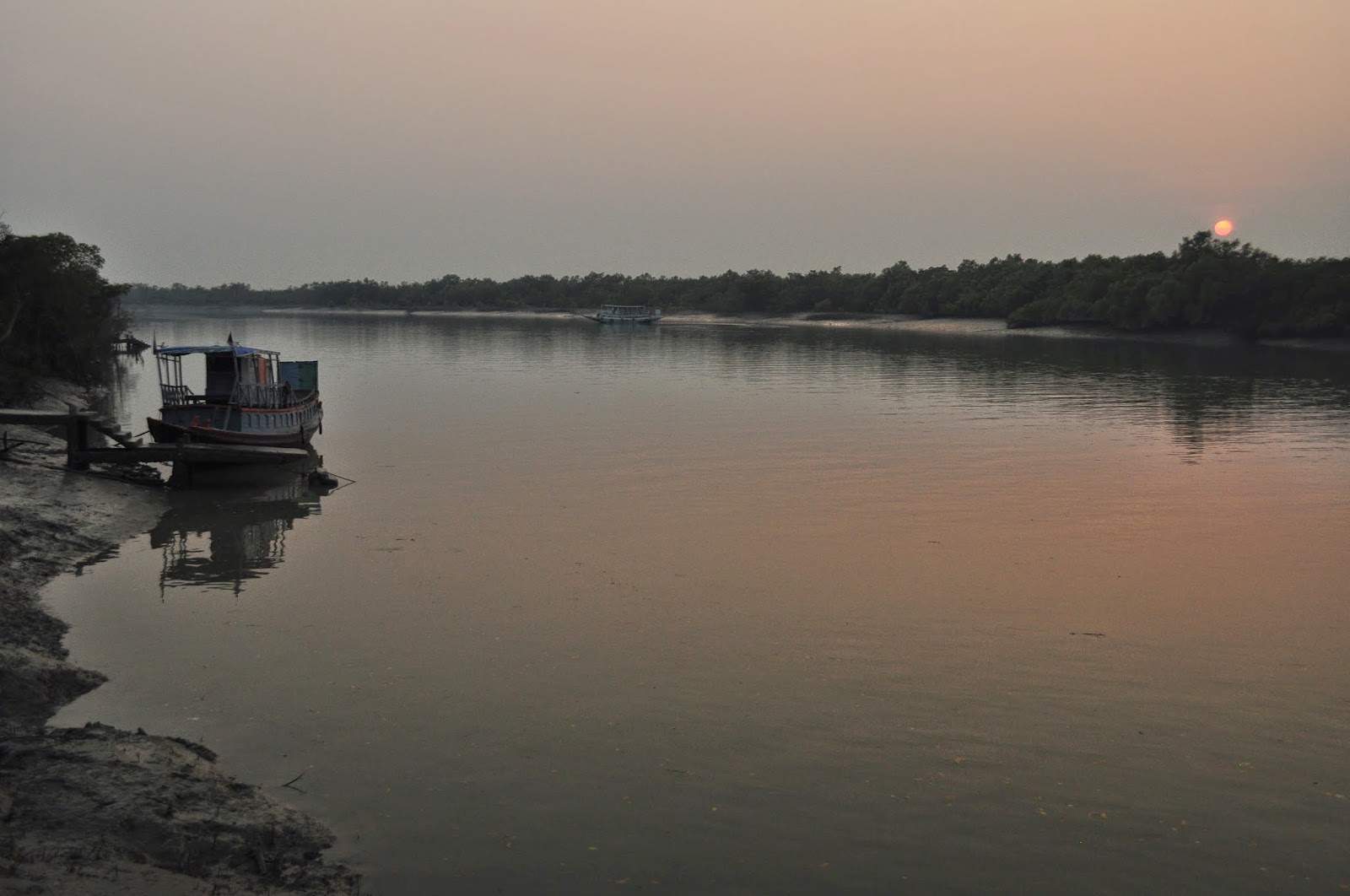 |
| "...the mother and child reunion is only a motion away..." |
The Sunderbans is perhaps the most dynamic land in all of India. Sculpted and remodelled every instant by a low tide and a higher one, it presents it's flora and fauna in a most remarkable way. For it is the largest tidal halophytic mangrove forest on Earth. And coincidentally it hosts one of Nature's most magnificent beasts - The Royal Bengal Tiger. The ever elusive big cat lends a momentary glimpse only to a limited few.Sunderbans is the most difficult place to spot one which in turn makes it a sort of challenge for tourists. And in pursuit of this challenge a large number of motorised boats traverse through the saline waters for 12 hours a day, diligently stopping at watch towers. And with each failed attempt at spotting a tiger, frustration follows close behind and it soon invites a plethora of comments from the tourists which are best left unsaid. This primarily happens because the Sunderbans has been symbolized, since the distant past, by Panthera Tigris which is quite misleading. If you're hoping to catch a glimpse of the four legged beast, then this blog will disappoint you terribly ! Because the Royal Bengal Tiger is only a tiny fraction of all that it has to offer. And this blog is about the remaining greater fraction which makes up the 'Tide Country' complete with it's own set of beliefs, ideals, people, and most importantly its emotions.
 |
| The 'Tide Country' |
Sunderbans
can be accessed easily from Kolkata. Nearest railhead is Canning. Kolkata
Airport is the closest airport, incase you are planning to fly. Detailed
transit routes are attached alongwith
the vital stats of the Sunderbans. Travel time from Kolkata varies from
4 to 5 hours.
Now that you
have finally reached the edge of the huge mangrove forest, you are desperate to
find a nice place to stay. There are plenty of staying options available at
Pakhirala, Gosaba. But all these hotels and resorts are situated in the buffer
zone of the forest. In the core zone there is only one option – the Sajnekhali
Tourist Lodge ( maintained by WBTDCL ). You will have to take a ferry across the river from
Pakhirala to reach the lodge gate. The place is infested with Rhesus monkeys.
They are practically everywhere waiting to pounce on whatever food materials
you might be having! So it’s better to put your food 'undercover' for sometime.
Checking in is a breeze thanks to the ever competent lodge staffs. Once you’re
out in the balcony you will get your first feel of the Sunderbans. The forest
surrounds the lodge compound on two sides. Territories are marked out clearly
by a green colored iron fence that is almost 10 feet in height. Just across the
fence, survival takes a new meaning and life is at all time risk.
 |
| Of Wooded |
 |
| Melancholia |
 |
| Sunny Spike Up ! |
 |
| 'Monitor'ing the Coast ! |
 |
| Of Patterns and Symmetry. |
On the first day of your trip , there is really not much exploring to be done because by the time you will reach Sajnekhali, it will be too late to explore any other island.Atmost you can visit "PakhirChor" in a rented ferry during the lazy afternoons for birdwatching.
A collage of some of the local birds spotted.You might have a better luck next time !
The actual trip begins next morning.
 |
| In Line. On Line. |
The only way to get in touch with the mangrove forest is the motorised boat. You climb onto one and immediately get drowned in the low humdrum of the six cylinder engine. As the boat leaves the jetty, the engine hums to the tune that seems offbeat to the very core. A few more hours later,the sound blends in with your subconscious.
 Inner Peace |
 |
| Tagged Along.Alone. |
 |
| A Wider Fit. |
Survival.
 |
| Red Specks of Crabs. |
 |
| Piercing Shadows. |
The vast saline stretches of water and the
mangroves on the shorelines will be your compatriots in this part of the
‘tide country’. The three layered greens and the muddy waters of the rivers,
together with a clear blue sky present a most contrasting picture. It magically
heals the eyes which are tired from searching the concrete jungle for the signs
of the living. Meanwhile a Greater Egret happens to stand like a lone sentry guarding the
tidal creeks and thankfully it poses for a moment in time.
 |
| The Lone Egret. |
Your boat sails on, venturing further into
narrower rivers that sing along with the tide and the ebb. The first stop is
the Dobanki Watchtower. Famous for it’s canopy walk, it’s your first chance to
come close to the forest and actually feel it’s pulse through the wired
fencing, constructed all along the path.
 |
| The Canopy Walk. |
All the watchtowers feature a sweet water pond which
are artificially dug to attract the wild for a drink. Most of the animal spottings
occur around these ponds especially during the twilight. You have reached
Dobanki at mid-day but fortunately a mother and a child deer along with an
Egret are present to raise your spirits !
 |
| The 'Right Angle'. |
 |
| Thirst. |
After spending about an hour or so at the Dobanki
Watchtower, it’s now time to move on to the next one on the itinerary :
Sudhyanyakhali Watchtower. This will again be a journey through the muddy
ripples of time sidelined by the greens. On this stretch you will pass through
a place called ‘Panchamukhani’. Translated into Bengali it means ‘five mouths’.
It is the conjunction of five rivers. And yeah, the result is indeed terrific.
When your boat is somewhere near the middle of the meeting point, you cannot
practically make out the horizon. Because the sky has blended into the rivers
and everything else is so infinitesimally tiny! It’s looks more like a huge
ocean than a confluence of five rivers! See it for yourself!
Past the Confluence, you're again back on track. The waters infront, all lead to the next watchtower !
Sudhanyakhali Watchtower is a special one because
it has recorded the maximum number of tiger spotting among all the others !
This is why it is also the most crowded watchtower in Sunderbans ! The best
time to visit it will be during the twilight zone. Because probability of
catching a glimpse of the big cat increases during this period because at the
end of the day, it is expected that His Royalty will come for a ‘sweet drink’ in
order to quench his thirst after a hearty lunch! The Forest Department folks
have done a brilliant work here. They have created four Corridors or Passages
through by clearing out sections of the forest. Thanks to these corridors, you
can easily spot any animal which is
trying to cross it. And this has resulted in a record number of game-spotting !
 |
| Corridors. |
A family of spotted deer and wild boars are here
to slurp up for the night ahead. The sweet water pond behaves like a clear
mirror according to the mood swings of the setting sun. And each reflection
counts in the wild.
 |
| The real and the image. |
The Stare.
 |
| Mirroring Patterns. |
 |
| Doe-Eyed. |
There are times in life when everything seems magical.Like the backdrop of the following two pictures. It seems like it has been lifted straight out of a Chronicles of Narnia book. It's really wonderful that the best magic in this world is hidden inside nature in a subtle way. And sometimes it just shines through.
After Sudhyanyakhali, it’s time to retrace your way back to
Sajnekhali island. The setting sun looks absolutely stunning. A penetrating
ruddy circle which is as fierce as the burning embers of a fire which is all consuming.
On your way back home, you cannot help but be mesmerized by
the feel of the mangrove islands. Life for each and every other organism is
indeed difficult. And you feel pity for them all. Yes, starting from the tigers
who ‘burn bright’, even after facing countless threats from Man and Nature
alike to the spotted deer which is still unaware of the danger lurking inside
the next shadow. From the innumerable fishermen and honey-collectors who venture into the shallowly
depths of the forest in search of a dangerous livelihood, to the rare Gangetic
Dolphins which are on the brink of extinction. You learn to feel for all of
them as you leave behind a trail of white ripples on the estuarine waters.
The entire length and breadth of the Sunderbans revolve
around a single abstract thing : Faith. It is faith which promises the Royal
Bengal Tiger of a sumptuous meal. It is the same faith with which a young deer
cub ventures for the first time beyond it’s
mother’s encapsulating protective ring. And it’s again faith which guides the
fishermen and the honey-collectors to the nameless, countless creeks where life
and death stage a one-act play every moment.
Here's to that same old faith which keeps the ebb and the tide turning.
 |
| Faith. |

















